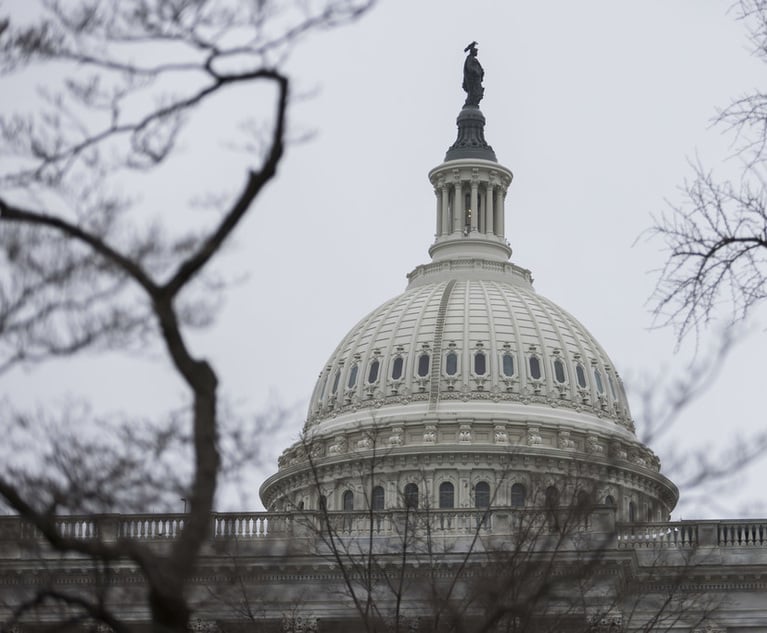 Booking photo of former President Donald Trump on Thursday, Aug. 24, 2023 at the Fulton County Jail in Atlanta. Credit: Fulton County Sheriff's Office
Booking photo of former President Donald Trump on Thursday, Aug. 24, 2023 at the Fulton County Jail in Atlanta. Credit: Fulton County Sheriff's OfficeElected but Convicted: Attempts to Delay President-Elect's Sentencing Were Unfounded and Exhausted
Defendant’s request was for the Supreme Court to wade into and disrupt the ordinary process of an ongoing state criminal proceeding.
January 16, 2025 at 12:27 PM
4 minute read
Those of us who practice criminal law are well aware of the general rules that interlocutory orders in criminal cases are not immediately appealable and that a judgment becomes final in a criminal case only after the imposition of a sentence. There are exceptions as when it comes to the review of a defendant's bail, but they are few and far between. In fact, there is an issue as to whether the Supreme Court, which recently denied Trump’s request to stay sentencing, even had jurisdiction to decide that issue.
So, when Trump asked for his sentencing in his hush money case to be postponed, he was certainly trying to avoid being labeled a convicted felon, but he was also trying to keep his conviction from being “final.” It’s not entirely clear why he wanted that because until sentencing, which creates the final judgment from which he can appeal, Trump cannot “officially” challenge the conviction on the theory that he was immune from prosecution.
NOT FOR REPRINT
© 2025 ALM Global, LLC, All Rights Reserved. Request academic re-use from www.copyright.com. All other uses, submit a request to [email protected]. For more information visit Asset & Logo Licensing.
You Might Like
View All

Special Series Part 6: If the Budget Guardrails Are Unconstitutional, What Happens Next?

Special Series Part 5: The State’s Bond Lock Impermissibly Delegates Legislative Authority

Special Series Part 4: The Statutory Guardrails Impermissibly Bind Future Legislatures
Trending Stories
- 1Automaker Pleads Guilty and Agrees to $1.6 Billion in Payouts
- 2MLB's Texas Rangers Search For a New GC and a Broadcasting Deal
- 3Does the Treasury Hack Underscore a Big Problem for the Private Sector?
- 4Gen AI Legal Tech Startup Eve Raises $47 Million Series A Investment
- 5Hicks Johnson Promotes Lori Arakaki and Daniel Scime to Firm Partnership
Who Got The Work
J. Brugh Lower of Gibbons has entered an appearance for industrial equipment supplier Devco Corporation in a pending trademark infringement lawsuit. The suit, accusing the defendant of selling knock-off Graco products, was filed Dec. 18 in New Jersey District Court by Rivkin Radler on behalf of Graco Inc. and Graco Minnesota. The case, assigned to U.S. District Judge Zahid N. Quraishi, is 3:24-cv-11294, Graco Inc. et al v. Devco Corporation.
Who Got The Work
Rebecca Maller-Stein and Kent A. Yalowitz of Arnold & Porter Kaye Scholer have entered their appearances for Hanaco Venture Capital and its executives, Lior Prosor and David Frankel, in a pending securities lawsuit. The action, filed on Dec. 24 in New York Southern District Court by Zell, Aron & Co. on behalf of Goldeneye Advisors, accuses the defendants of negligently and fraudulently managing the plaintiff's $1 million investment. The case, assigned to U.S. District Judge Vernon S. Broderick, is 1:24-cv-09918, Goldeneye Advisors, LLC v. Hanaco Venture Capital, Ltd. et al.
Who Got The Work
Attorneys from A&O Shearman has stepped in as defense counsel for Toronto-Dominion Bank and other defendants in a pending securities class action. The suit, filed Dec. 11 in New York Southern District Court by Bleichmar Fonti & Auld, accuses the defendants of concealing the bank's 'pervasive' deficiencies in regards to its compliance with the Bank Secrecy Act and the quality of its anti-money laundering controls. The case, assigned to U.S. District Judge Arun Subramanian, is 1:24-cv-09445, Gonzalez v. The Toronto-Dominion Bank et al.
Who Got The Work
Crown Castle International, a Pennsylvania company providing shared communications infrastructure, has turned to Luke D. Wolf of Gordon Rees Scully Mansukhani to fend off a pending breach-of-contract lawsuit. The court action, filed Nov. 25 in Michigan Eastern District Court by Hooper Hathaway PC on behalf of The Town Residences LLC, accuses Crown Castle of failing to transfer approximately $30,000 in utility payments from T-Mobile in breach of a roof-top lease and assignment agreement. The case, assigned to U.S. District Judge Susan K. Declercq, is 2:24-cv-13131, The Town Residences LLC v. T-Mobile US, Inc. et al.
Who Got The Work
Wilfred P. Coronato and Daniel M. Schwartz of McCarter & English have stepped in as defense counsel to Electrolux Home Products Inc. in a pending product liability lawsuit. The court action, filed Nov. 26 in New York Eastern District Court by Poulos Lopiccolo PC and Nagel Rice LLP on behalf of David Stern, alleges that the defendant's refrigerators’ drawers and shelving repeatedly break and fall apart within months after purchase. The case, assigned to U.S. District Judge Joan M. Azrack, is 2:24-cv-08204, Stern v. Electrolux Home Products, Inc.
Featured Firms
Law Offices of Gary Martin Hays & Associates, P.C.
(470) 294-1674
Law Offices of Mark E. Salomone
(857) 444-6468
Smith & Hassler
(713) 739-1250










